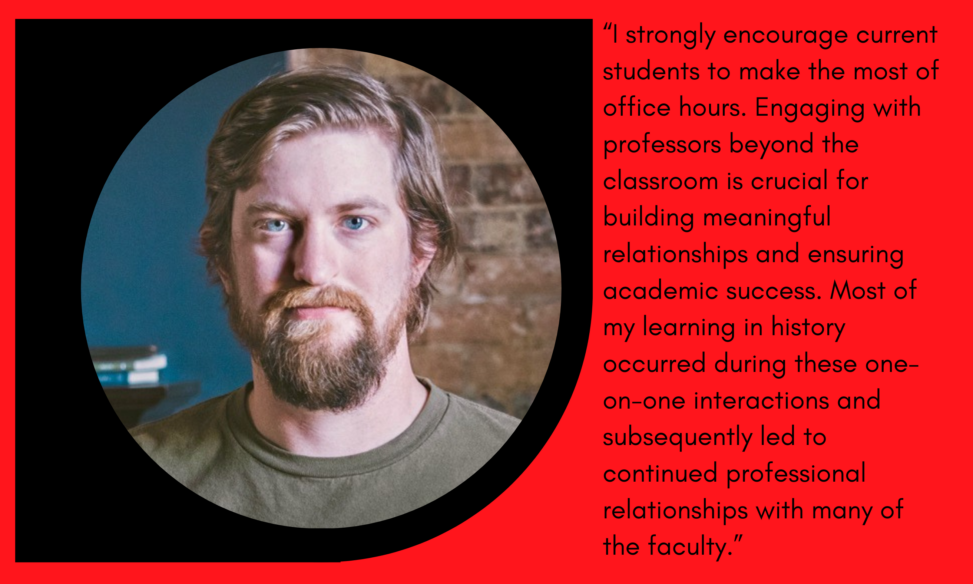I am originally from Northern Arkansas. My journey to U.C. and as a current educator has been as diverse as it has been enriching. Before U.C., I spent the better part of a decade traveling, an experience that broadened my perspectives and deepened my appreciation for history and culture. I attended UC a little later in life and thoroughly enjoyed the experience! I am interested in photography, environmental history, and hiking and tend to be a perpetual hobbyist.
What are you up to these days?
I am the Social Studies Chair and International Baccalaureate (IB) Teacher at Purcell Marian. Additionally, I am completing my graduate studies in school counseling, focusing on crisis response and curriculum development for future educators. I also run a leatherworking business that uses traditional craftsmanship and develops funding processes for non-profit organizations that give back to the environment.
What brought you to history at UC?
My academic journey at the University of Cincinnati began when my wife and I moved to Cincinnati for her career. The strong faculty and research focus at U.C. were pivotal in my decision to pursue a dual degree in History and Education. My goal was to become a proficient social studies educator, and I felt that UC’s department offered the best environment in the city for my academic growth.
What did you focus on as a history student at UC?
At UC my approach to studying history was driven more by an interest in the professors than in any single subject matter. I immersed myself in a variety of history courses, eventually gravitating toward nuclear proliferation and environmental history as a focus area. Among my favorite courses were World History with Dr. Longfield Karr, whose critical feedback immensely enhanced my research skills, and Nuclear World with Dr. Jason Krupar, which piqued my interest in nuclear proliferation. Additionally, Native American History with Dr. Rebecca Wingo left a lasting impact, blending historical depth with empathy and understanding.
What did you focus on in your capstone and why?
For my Capstone, I focused on the production, pollution, and conspiracy theories surrounding the Rocky Flats Nuclear Weapons Plant outside of Denver, CO. The project was a fun mix of personal, academic, and roadside attractions, making the research and writing experience much more enjoyable than I anticipated. While driving out of Denver to go camping with my wife, we passed the Cold War Horse monument, a huge horse covered in red hazmat gear that overlooks a newly built suburban neighborhood. Obviously, when you see something like this, you have to stop and research. My wife, who grew up in the area, shared her insights and the local community’s perspective on Rocky Flats. Her stories brought a human dimension to what had been, until then, a topic that wasn’t even remotely on my radar. At the time, I was also taking Dr. Jason Krupar’s class on nuclear history, which allowed me to create a research proposal and get relevant resources immediately. I am incredibly thankful for the experience, as the combination of my wife’s anecdotes and the academic content from the class led me down a fascinating research path. It’s a great example of how, sometimes, historical research isn’t confined to archives or libraries; it can start from a simple conversation or a stop at a roadside monument. This experience was a reminder of the value of blending personal narratives with scholarly research to fully understand a historical site’s impact and that if you see something interesting on the side of the road, it’s probably worth the stop.
What skills did you pick up from studying history that have served you well beyond your courses?
The most valuable skill I picked up is the ability to quickly and critically review and evaluate large volumes of information. It has been an invaluable skill and instrumental in my roles as an educator, a graduate student, and an informed citizen.
Have any advice for current students?
I strongly encourage current students to make the most of office hours. Engaging with professors beyond the classroom is crucial for building meaningful relationships and ensuring academic success. Most of my learning in history occurred during these one-on-one interactions and subsequently led to continued professional relationships with many of the faculty.
